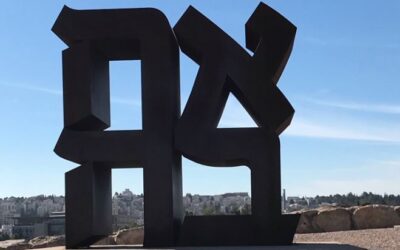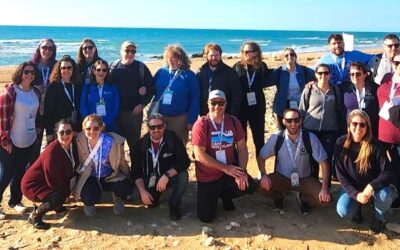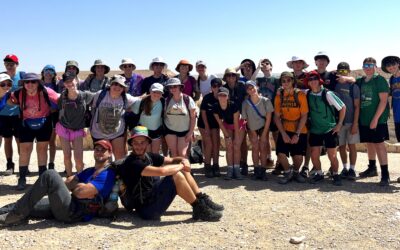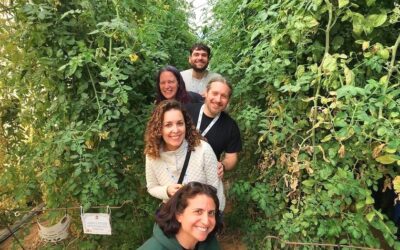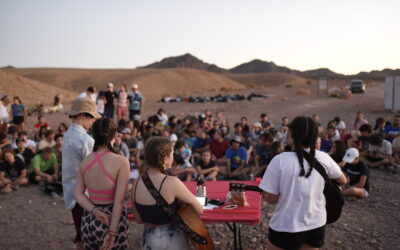By Maya Kendall, Bus 7 Participant
My earliest memory of learning about the Shoah begins in fourth grade. I was nine years old, sitting in Hebrew School, watching videos of bodies being dragged and tossed onto piles of more dead bodies. I had no idea what I was seeing, who these people were, or why they were dead. I didn’t know that some of those people were my own family. Since then, my Shoah education has not changed. Much of it has revolved around pictures of dead people with no context other than a teacher saying that there were bad people, Nazis, who killed a lot of other people.
It wasn’t until sixth grade that I learned who the Nazis were actually killing. I also learned that my great-grandfather was in this prison called a concentration camp, and that his brother, nieces and nephews died in that same place. I had no idea what a concentration camp was, and I never really understood the magnitude of what had happened in these camps until going to Poland to visit one. I was expecting the camps to be full of death. Gas chambers with chimneys still erect and ready for more victims. Nazi watchtowers looking over us as we walked through the camps. I imagined the whole camp to be black and white and for there to be no sign of life anywhere; no green grass, no music, no laughter, no smiles, no love.
In Poland, there is a town called Kazimierz Dolny where a massive castle stands that once belonged to King Kazimierz. The King was very important to the Jewish community and its ability to thrive in pre-Shoah Poland. The King had a mistress, as many kings do, but this mistress was different from others. She was Jewish. Her name was Esther and the King was madly in love with her. Because his beloved mistress was Jewish, the King gave the Jews a lot of rights that made them almost equal in society to Christians. Although the Jews were given advantages that they didn’t have anywhere else, they still were not completely integrated into Polish society. They were kept physically separate from everyone else in a town where no one else lived other than Jews. This place and story are important because they show how Judaism was respected pre-Shoah, albeit only to a limited degree. For example, in this case, the Jews were accorded some rights because the King’s secret lover was Jewish, but weren’t made fully equal.
This concept of Judaism being “not fully equal” has parallels in today’s society. Jews are respected in a lot of places in the United States and are treated the same as everyone else under the law, but they’re not yet fully equal. For example, my best-friend is Christian. She loves me for who I am and does not see me differently because I’m Jewish, but whenever she generalizes a group of people she always says, “and the Jewish ones too,” as if Jews are somehow not understood as part of the general group to which she is referring. It is very hard for people who aren’t Jewish and don’t experience this feeling of separateness to understand that they are perpetuating the problem of Jews being viewed differently. The story of Kazimierz shows that Jews thrived in Poland, but weren’t given the opportunity to fulfill their real potential in society because they were kept apart.
Before the state of Israel was created and Jerusalem became the Jewish capital of the world, Lublin was the center of Jewish life. Lublin was referred to as the “Jerusalem of Poland.” There were many yeshivas in Lublin that did not provide a place to sleep for those that attended. Poor families that hosted the boys had to feed them even though they barely had enough to feed themselves. A prominent leader at the time, Rabbi Shapira, realized that students couldn’t study and gain knowledge if they were focusing on where their next meal would be coming from, so he created a new Yeshiva in Lublin. This yeshiva provided its students with three meals a day and medical care. The students had an environment in which they were able to focus on their studies and live comfortably. With this innovation, Rabbi Shapira changed Jewish education forever. I’m personally very thankful for this change in Jewish education because it affects my life directly. At Crane Lake, we receive three meals a day, medical care, and a place to sleep. I feel very privileged that I have all of these things and that I’m able to study and grow from my learning.
In addition to providing students with meals and housing and medical care, Rabbi Shapira also wanted to unite Jews all over the world through the study of Talmud. That is why he created Daf Yomi a system where the same one page of Talmud is read each day by everyone around the world. It takes approximately seven and a half years to get through the entire Talmud one page at a time. I think there is something very special about being connected to Jewish people around the world through the simple act of reading and analyzing Talmud. In my life, this concept is also relevant, even though I’m not a scholar of Talmud. Whenever I discover that someone I know or meet in North America is Jewish, there is an instant connection between us. We often have so much in common and lots to talk about: Jewish summer camp, Hebrew school, studying for our b’nai mitzvot, or simply our favorite holiday foods. Knowing that I am connected to Jewish people just like me all across the world similar to the way Rabbi Shapira envisioned with Daf Yomi is incredible. Even though, as Jews, we endure so much pain, we come together and unite, which makes us stronger in the face of adversity. We’re ready for anything that comes our way.
In Poland, there is a beautiful synagogue called The Ramah’s Synagogue. It was built by Reb Isserl, who was a wealthy, kind, devoted Jew. He made his money selling fabric. Every Friday at 12:00 pm he would close up shop to prepare for Shabbat. One day, Satan came in to test Reb Isserl. Satan came in the form of a wealthy man who wanted to buy a lot of fabric and pay the Reb a lot of money. He came in at 11:30 and the Reb said that he could buy fabric as long as he was out by 12. Satan was not finished by 12 and he said to the Reb that if he didn’t continue to help him, he would never come back to the store. The Reb kicked Satan out and closed up shop because he valued his commitment to Judaism more than making money. Sometimes, in my own life, I have to decide between my commitment to Judaism and something else that might benefit me. For example, on Friday nights when my friends want to hang out after my family has lit the shabbat candles, I have to decide whether I want to break Shabbat and go out, or continue spending time with my family and resting. A lot of the time I do break Shabbat and go out because I don’t want to be left out, and I think that’s reasonable for a teenager living in a secular city. At the same time, I feel a sense of guilt because I don’t want to spend every Shabbat with my family. After this Poland trip, I have learned from the story of Reb Isserl about how important Shabbat is. From now on, I want to spend Shabbat with my family and make sure that they also rest and understand the importance of Shabbat.
One of the concentration camps we visited was Auschwitz. My great grandfather is a Holocaust survivor who had experienced Auschwitz first hand, while several other family members died there. Because of this, I was expecting to feel a very personal connection to the camp. When we arrived I felt like I was in a museum because there was a concession stand and a restaurant. I decided to ignore that distasteful display and prepare myself for the tour of Auschwitz.
Unfortunately, I was let down by the little connection I felt during the tour. The only time I felt a true connection to the camp was when we entered a room where we could see the faces of the subjects of the vague stories we heard. This room was extremely difficult for me to handle, yet I could not look away. I felt an obligation to say each and every one of the names on that wall so that they would not be forgotten. In fact, I was the last person to leave the room because it took a good amount of time to say every name. Taking the time to do so was my way to afford these victims as much justice as I possibly could.
Also at Auschwitz, I was really effected by an exhibit dedicated to the children who perished during the Holocaust. I have two younger sisters and a lot of little cousins with whom I love to draw and do arts and crafts. Most of the time my sisters and my cousins draw flowers, or rainbows, or just a mess of bright colors. Seeing children’s drawings of people being hanged and murdered broke my heart. Kids draw what they see, and the way they draw depicts how they are feeling, whether they know it or not. These children were being exposed to murder and torture and it was reflected in the artwork I saw. The horrific scenes were burned into their memories as they had to watch their own families being murdered. I pray everyday that my little sisters and cousins will never have to experience anything as horrible as these children did. I also pray that they will never understand the feeling of losing someone close to their age. Even when I was ten, losing my grandmother was a confusing, emotional journey that scarred me. Although Auschwitz felt more like a museum, this exhibit was very important because it showed the horror and torture that millions of children had to endure.
Throughout my experience in Poland, I felt a range of emotions that I could not express in the moment. Still today, it is hard for me to pick out the words to describe how I was feeling. I have begun to understand that it is okay to not know what I’m feeling, or if what I’m feeling is what other people are feeling. I have learned to accept my emotions, no matter how confusing they may be.

